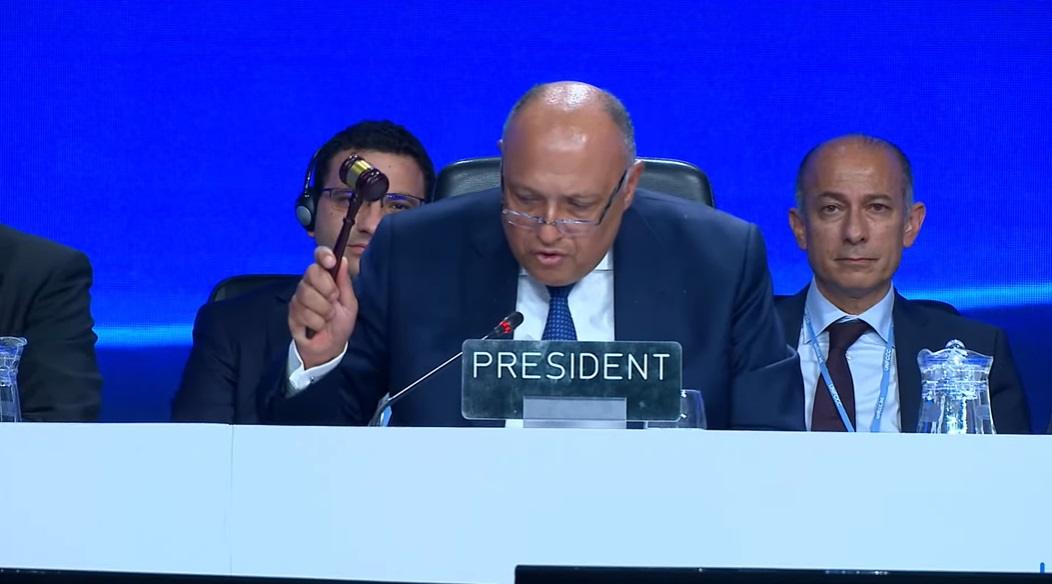COP27: Breakthrough on Funding Repair of Climate Damage, Frustration on Fighting Climate Change
After marathon negotiation sessions extended nearly two days past the scheduled Friday deadline, a final agreement was reached at the COP27 climate conference on Sunday, including a landmark deal to fund poorer countries’ response to climate change-related loss and damage, but little progress on key climate mitigation areas, such as raised national emissions ambitions or commitments to transition from fossil fuels to cleaner energy sources.
The clear highlight of the conference finale was the “Loss and damage” agreement, with developed nations committing to set up a fund that would pay for climate-change related damage in poorer, vulnerable countries. The agreement marks the first time that the issue has made it past objections of wealthier countries to become officially adopted. Under the agreement, a new dedicated fund to assist developing countries in responding to loss and damage will be launched, and a “transitional committee” has been established to recommend on ho to operationalize countries’ funding arrangements and the fund itself, at next year’s COP28.
There was an additional agreement to operationalize the “Santiago Network for Loss and Damage,” providing technical assistance to developing countries that are particularly vulnerable to the adverse effects of climate change.
Commenting on the loss and damage accomplishments at the conference, EU Commission President Ursula von der Leyen said:
“I am pleased that COP27 has opened a new chapter on financing loss and damage, and laid the foundations for a new method for solidarity between those in need and those in a position to help. We are rebuilding trust. This is crucial moving forward because there can be no lasting action against climate change without climate justice.”
The significant move forward on funding climate-related damage, however, appeared to come at the cost of progress on climate mitigation commitments, frustrating some countries’ efforts to push for more ambitious language in the final agreement. The UK, for example, had expressed hope to formalize a commitment to have global emissions peak by 2025, and the EU had been calling on calling on major economies to immediately ramp up their near-term climate goals, or Nationally Determined Contributions (NDCs).
The final agreement, however, was not more ambitious than last year’s COP26 document, removing the 2025 peak emissions goal at the last minute, and only reiterating the goal of limiting temperature increase to 1.5°C.
According to COP26 President Alok Sharma, even maintaining last year’s progress proved challenging. While noting the “historic” loss and damage deal, Sharma said:
“Indeed those of us who came to Egypt to keep 1.5 degrees alive, and to respect what every single one of us agreed to in Glasgow, have had to fight relentlessly to hold the line.”
Similarly, the agreement failed to secure progress on last year’s commitment to phase down coal, or to add a pledge to phase down fossil fuels, with the final agreement only calling for an “increase in low-emission” energy and renewables, keeping the door open for continued fossil fuel use paired with carbon capture initiatives.
Sharma added:
“Emissions peaking before 2025, as the science tells us is necessary. Not in this text. Clear follow-through on the phase down of coal. Not in this text. A clear commitment to phase out all fossil fuels. Not in this text. And the energy text, weakened, in the final minutes.”
Beyond the final negotiations, COP27 did see movement on several significant business and finance-related initiatives, including the release of a new set of proposals to set clearer standards for the net zero pledges announced by businesses and other non-state entities, and the establishment of a $20 billion public/private-financed Just Energy Transition Partnership.
Despite the conference’s achievements, however, several leaders expressed frustration at the lack of overall progress.
In his speech at the closing of the COP27 plenary, EU Commission Vice President Frans Timmermans said that the final agreement is “not enough of a step forward for people and planet,” adding:
“It does not bring enough added efforts from major emitters to increase and accelerate their emissions cuts. It does not bring a higher degree of confidence that we will achieve the commitments made under the Paris Agreement and in Glasgow last year.
“It does not address the yawning gap between climate science, and our climate policies.”





